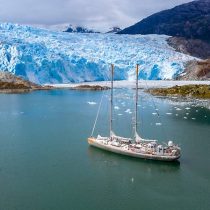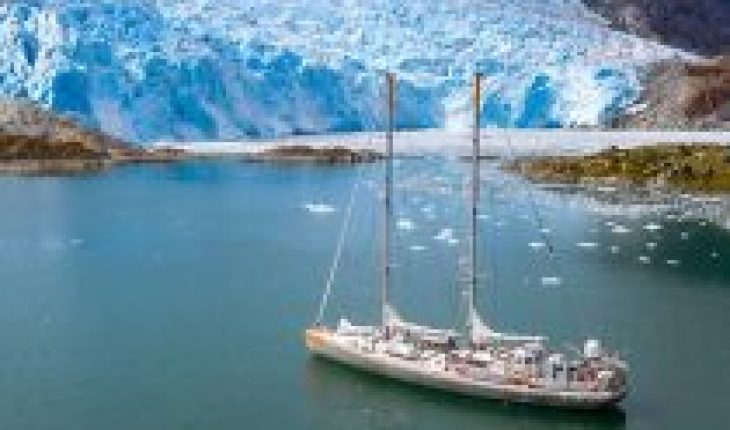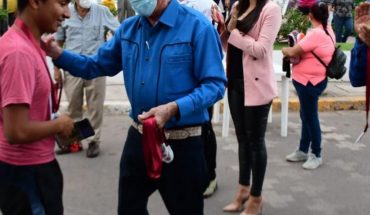
After three months sailing along the coasts of Chile from south to north, the laboratory ship Tara said goodbye to the national territory to continue its journey through the Caribbean seas and the South American Atlantic. The expedition will continue to study the Pacific and Atlantic coasts to understand the effect of the ocean and its microorganisms on climate change.
In Chile, nine research centers participated and contributed their knowledge to contribute to one of the most ambitious scientific expeditions of this century. The national laboratories, coupled in the CEODOS program, delivered their scientific perspectives and worked in a multidisciplinary way to carry out this project in our country.
From France, the scientific director of the Tara Ocean expedition, Erik Karsenti, explained that the idea of this journey “was to organize the sampling on a global scale, as exhaustive as possible, of small organisms in the ocean, such as single-celled organisms and some multicellular organisms of a few centimeters”.
microorganisms
The expedition departed through Punta Arenas, earlier this year, and then stopped at the ports of Puerto Montt, Talcahuano, Valparaiso and Iquique. There, the schooner collected information on the microorganisms that inhabit the depths of the Chilean sea. This, with the intention of gathering enough information to understand what the impact of the sea has on climate change mitigation.
Alejandro Maass, co-director of the CEODOS program and director of the Center for Mathematical Modeling at the University of Chile, valued the participation of various scientific perspectives to contribute to this study. In addition, he added that “these expeditions are tremendously multidisciplinary, where oceanographers, genomic experts, and experts in data analysis, among others, came together to solve this great challenge of quantifying the ecology and evolution of the most important biological mass on the planet.”
For her part, the co-director of CEODOS, Camila Fernández, explained that the work done in Chile will solve a series of questions to understand the deepest of the mechanisms that govern the biological productivity of the marine ecosystem.
“We have made the first diagnoses on the health of the biological pump of the Chilean coastal ocean, with the best tools available for the sequencing of the microbiome,” he explained.
Microbiome in Chile
On the importance of passing through the waters of Chile, Karsenti explained that in the glaciers of Chilean Patagonia there is an interface where fresh and salt water converges, “which allows us to see the role of the environment in this structure of the ecosystem. This is particularly important because we have impact problems on the coastal ecosystem, obviously produced by global warming and the significant pollution carried out by humans on Earth,” said the French scientist.
The Minister of Science and Technology, Andrés Couve, valued this participation between scientists from France and Chile, adding that “we are entering what is going to be the definition of Chilean ocean policy, which for the first time incorporates science. This type of collaborative, multidisciplinary project is the kind of science that we must promote as a country.”
In addition, the secretary of state emphasized that “these collaborative actions are strategic for Chile and for the great global challenges, such as climate change.”
To conclude this expedition along the national coasts, the representatives of this scientific intervention held a workshop called “France-Chile Cooperation on Oceans, Biodiversity and Climate Change: New Scientific Perspectives to Explore the Ocean”. There, the representatives of each country in this research, including political and scientific authorities, delivered their balance sheet on the passage of the schooner Tara along the Chilean Sea.
In addition to the scientific expedition, the crew of the schooner Tara and the scientists who supported this research in Chile carried out a series of educational activities with schools in the different ports where the sailboat docked. Now, the vessel will continue its course through the Panama Canal, to skirt South America through the South Atlantic, until it reaches Antarctica. They will then cross the ocean to gather information from the marine microworld off the coast of Africa, and finally return to the coasts of France in 2022.
The national research centers that participated in this research are the Modelami Centerento Matemático (CMM); the Associated International Laboratory “Multiscale Adaptive Strategies” (Lia Mast); the Centre for Climate Science and Resilience (CR2); the Center for Dynamic Research of High Latitude Ecosystems (IDEAL); the Center for Research in Ecosystems of Patagonia (CIEP); the Oceanographic Research Centre (Copas Sur-Austral); the Center for Genome Regulation (CRG); the Interdisciplinary Center for Aquaculture Research (INCAR) and Inria Chile.





